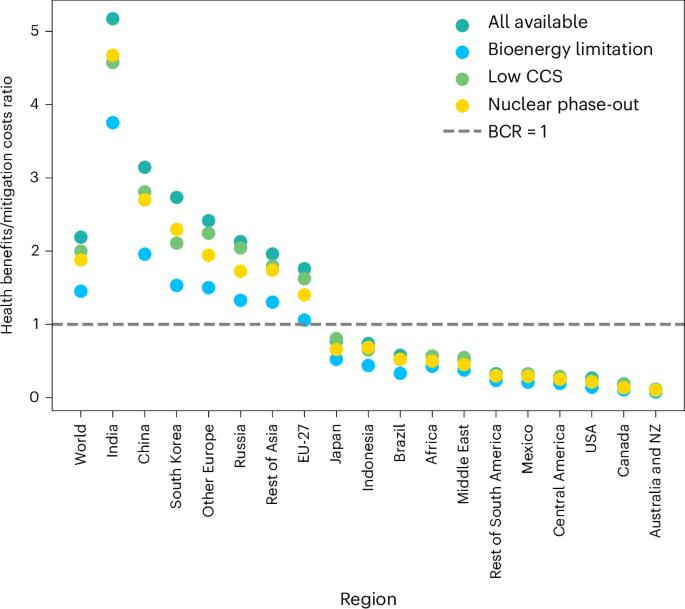Improving cost–benefit analyses for health-considered climate mitigation policymaking
IF 27.1
1区 地球科学
Q1 ENVIRONMENTAL SCIENCES
引用次数: 0
Abstract
There is growing discussion about enhancing climate policy efficiency by prioritizing health, with expectations for including health co-benefits in the next round of nationally determined contribution updates. Critical to this effort is the need to compare the benefits to the costs of mitigation. Here we synthesize the current cost-effectiveness of climate policies based on health-included cost–benefit analyses and identify key research challenges and opportunities for scaling up health-considered or even health-centred climate policies. Furthermore, we show factors essential to accelerating the development and implementation of mitigation policies, including providing tangible and policy-relevant health co-benefits, promoting interdisciplinary contributions and cross-sector policy engagement, conducting regional studies and improving inter-study comparability, and exploring health-considered optimized strategies. Mitigation actions can have large-scale health co-benefits, which, however, are not effectively incorporated into policy design and implementation. This Perspective overviews the health co-benefits and cost-effectiveness of climate policies and discusses ways to improve their policy relevance.


改进考虑健康的气候减缓政策制定的成本效益分析
人们越来越多地讨论通过优先考虑健康来提高气候政策效率,并期望在下一轮国家自主贡献更新中纳入健康协同效益。对这一努力至关重要的是,需要比较缓解的收益与成本。在这里,我们综合了基于健康的成本效益分析的气候政策的当前成本效益,并确定了扩大考虑健康甚至以健康为中心的气候政策的关键研究挑战和机遇。此外,我们还展示了加速制定和实施减缓政策的关键因素,包括提供切实的和与政策相关的卫生共同效益,促进跨学科贡献和跨部门政策参与,开展区域研究并提高研究间的可比性,以及探索考虑健康的优化战略。
本文章由计算机程序翻译,如有差异,请以英文原文为准。
求助全文
约1分钟内获得全文
求助全文
来源期刊

Nature Climate Change
ENVIRONMENTAL SCIENCES-METEOROLOGY & ATMOSPHERIC SCIENCES
CiteScore
40.30
自引率
1.60%
发文量
267
审稿时长
4-8 weeks
期刊介绍:
Nature Climate Change is dedicated to addressing the scientific challenge of understanding Earth's changing climate and its societal implications. As a monthly journal, it publishes significant and cutting-edge research on the nature, causes, and impacts of global climate change, as well as its implications for the economy, policy, and the world at large.
The journal publishes original research spanning the natural and social sciences, synthesizing interdisciplinary research to provide a comprehensive understanding of climate change. It upholds the high standards set by all Nature-branded journals, ensuring top-tier original research through a fair and rigorous review process, broad readership access, high standards of copy editing and production, rapid publication, and independence from academic societies and other vested interests.
Nature Climate Change serves as a platform for discussion among experts, publishing opinion, analysis, and review articles. It also features Research Highlights to highlight important developments in the field and original reporting from renowned science journalists in the form of feature articles.
Topics covered in the journal include adaptation, atmospheric science, ecology, economics, energy, impacts and vulnerability, mitigation, oceanography, policy, sociology, and sustainability, among others.
 求助内容:
求助内容: 应助结果提醒方式:
应助结果提醒方式:


